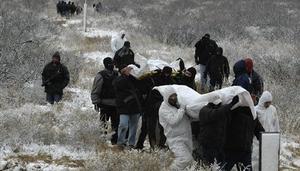Mexico: descent into chaosForeign firms have largely escaped the worst of Mexico violence, so far
Foreign companies have so far escaped the worst of a rising tide of crime in Mexico; if they can be shielded from violence, foreign companies are likely to focus on the virtues of doing business in Mexico, such as low labor costs, proximity to the American consumer, and favorable trade treatment

The violence of the Mexican drug war continues, but business has largely escaped the carnage // Source: wn.com
Bodies pile up in Mexico’s drug war, and local businesses are bearing the brunt of violence, extortion, and kidnapping, but big foreign-run firms have so far been spared the worst of a rising tide of crime.
More than 26,000 people have died since late 2006, when Mexican president Felipe Calderon launched a crackdown on cartels smuggling drugs into the lucrative U.S. market. Violence is getting worse in areas where armed gangs hold sway, like the northern region home to factories churning out goods to be sent across the border to the United States.
Msnbc reports that while there are signs drug crime is discouraging investment and denting business for smaller firms operating in the most violent areas, the picture is not as grim for many large firms that so far have been able to keep those dangers at bay (see “Ciudad Juárez is extremely violent, but U.S. companies are still going there,” 14 June 2010 HSNW). “When (criminals) go looking for theft and kidnapping opportunities, there are lots of easy hits,” said Albert Zapanta, who heads the U.S.-Mexico Chamber of Commerce.
He said the cartels, even as they launch bold attacks on security forces and each other, have so far preferred to target lower profile firms or local businessmen that may not be able to afford elaborate security or are vulnerable in other ways. “Take on Wal-Mart, and you’re going to have a whole lot of problems,” Zapanta said.
Foreign executives are rarely seen on the factory floor and go to great lengths to protect their safety. Industrial plants have vault-like security while trucks loaded with cars, TVs, and airplane parts are easily tracked by satellite.
Whereas Mexican entrepreneurs can expect face-to-face threats from racketeers, foreign plant managers whose families and property are north of the border are not as vulnerable. Roughly 3,400 managers, engineers and other support staff live in El Paso, Texas but cross the border each day for work in 360 nearby Mexican factories, or maquiladoras, according to the El Paso Regional Economic Development Corp.
The violence is “absolutely not an obstacle to the development of our business,” Carlos Ghosn, CEO of Nissan Motor Co, said during a recent visit to Mexico City. Nissan plans to spend $600 million to upgrade plants in Mexico and will start making three new low-cost cars at a plant in northern Mexico, positioning the country as its supply hub for markets in the Americas.
If they can be shielded from violence, foreign companies are likely to focus on the virtues of doing business in Mexico, such as low labor costs, proximity to the American consumer, and favorable trade treatment.
